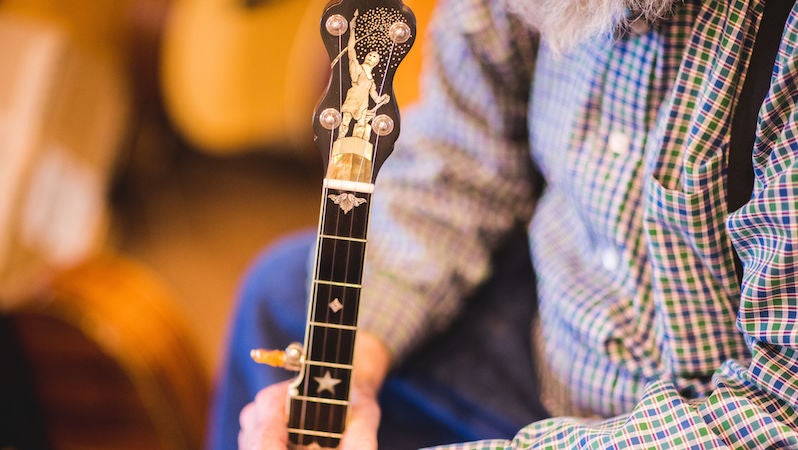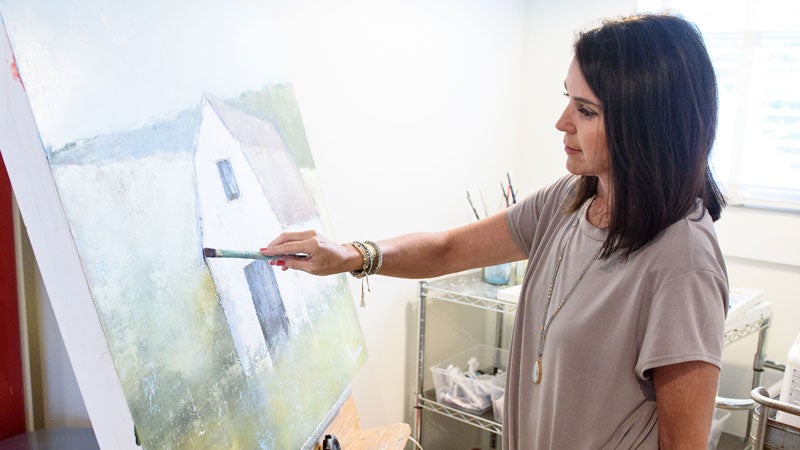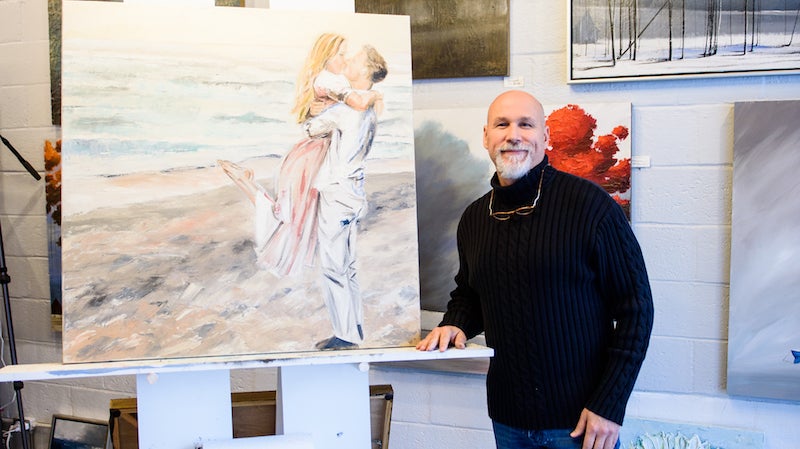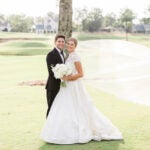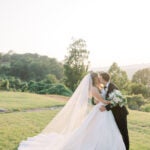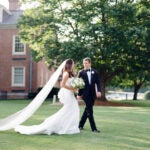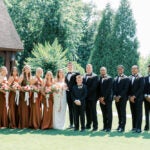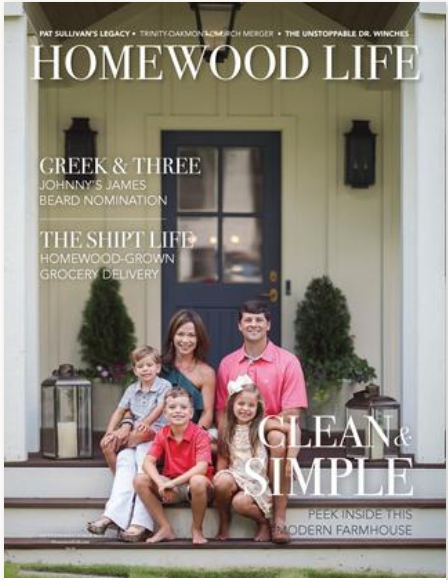By Kaitlyn Baker
Through the door of a Linden Avenue house-turned-music-store, a collection of guitars, mandolins, banjos and ukuleles line the walls. Cozy living room furniture is scattered about Fretted Instruments. Hard-shell guitar cases lie on the floor and stand up against the walls —“all full,” says the owner, Herb Trotman. In the middle of the room, there’s a work table with an assortment of tools on top. This is where Herb “sets up” instruments for his customers (think a vehicle tune up for instruments — by tweaking different settings, you can optimize the sound and feel of the instrument).
The walls, around and behind the instruments, bear pieces of art Herb has gathered over the years — some he bought just because he liked, others artists made specially for him. One painting by Herb’s wife Cathy depicts a puppet David Stephens of Atlanta made of Herb on his 75th birthday. Big grin and banjo in hand, the resemblance is striking. Scattered among the artwork are markers of his achievements, including a framed certificate from his initiation into the Alabama Bluegrass Music Hall of Fame and his photo on the cover of Banjo Newsletter.
“I’ve spent more time in this building than anywhere else in my life,” Herb says of his beloved music store. He and his partners opened it in 1974.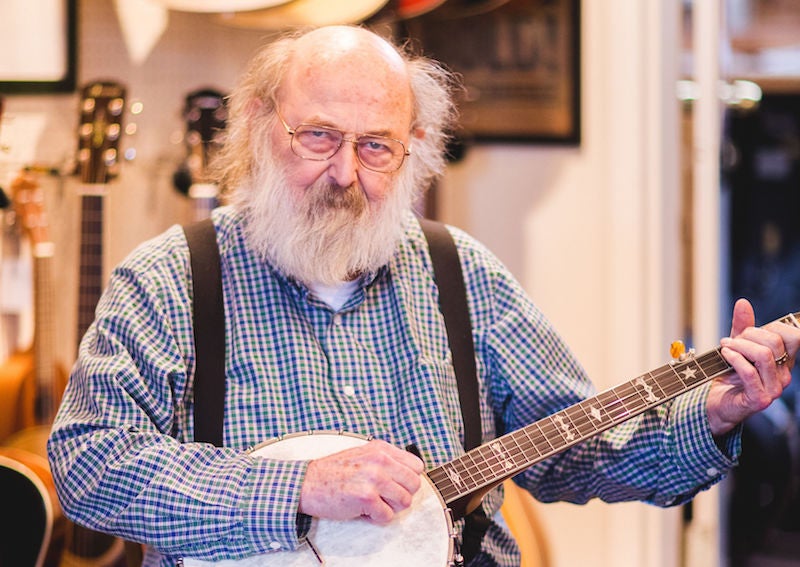
“We were just going to teach,” Herb recalls. “The instruments that students would bring were not what we would want them to play on. They were going to be hard to learn on.” Herb says he would end up “setting them up” so they would be easier to play. “It dawned on us that we should just sell them ourselves. That way we would know they were set up to start with,” Herb says.
That’s how Fretted Instruments started not only teaching and doing repairs but selling instruments too. Of course, as someone told him recently, “Herb has never sold a guitar, but a lot of people have bought them.” That’s one of the things Herb is really gifted at — matchmaking people with instruments.
“I make people sit and play,” Herb says. He asks them a couple questions to get an idea of what they’re looking for. What size do you want? What’s your price range? Then he makes sure they play something above and below their range, so they know where they land in the mix. “Some people say, ‘I really want that one,’ and I just say, ‘Well, go save a little more, and don’t buy something that you’re gonna be sorry every time you look at it.’”
That’s Herb’s philosophy for both buying and selling instruments, and it’s one reason he doesn’t sell online. “I want them to be absolutely sure that when they open the case for the rest of their life, they’re happy they bought that guitar,” he says. “The more you play a guitar, the cheaper it is per note.” And Herb has been playing for a long, long time.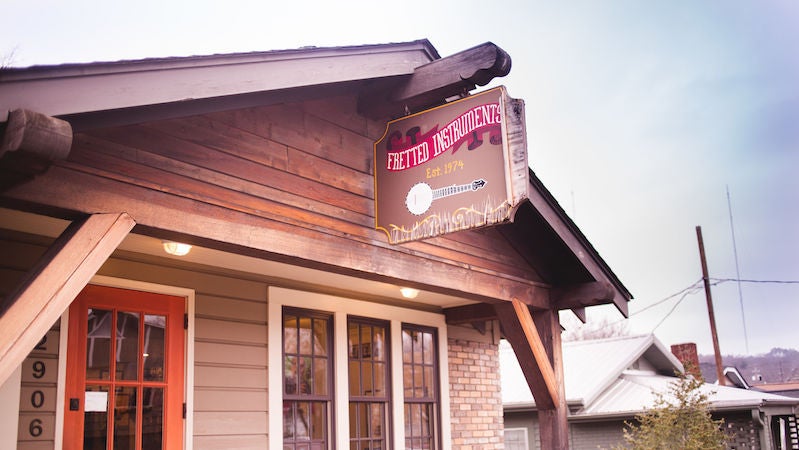
When Herb was about 5 years old, his dad would fret the ukulele (or press the strings down to get a desired pitch) and let him strum it. One day they were playing and his dad got up to go do something. Herb sat down with the ukulele. He stared at the music. He looked at how the chords changed from one to the next. That’s when he “got it.”
“Everybody that’s played, I don’t care if they’ve played 50 years, they can tell you the first time they said, ‘I got it!’” Herb says. “They can tell you the instant, where they were and what they did.”
Ever since that day in his early childhood, Herb has been making music in one way or another. Through high school, college and beyond, he played in a number of bluegrass bands. In the early ’70s, there was Herb Trotman and the Spaulding Brothers. In the late ’80s and early ’90s, he was with Claire Lynch & the Front Porch String Band. In the last decade, you may know him from the Herb Trotman Band.
But touring was never his passion. Teaching was, and it still is. That’s what the store has allowed him to do. “I get to … be around the instruments I love, and I get to teach,” Herb says. “And that’s the part that’s the most fun for me.”
Allen Barlow, founder of Homewood School of Music, taught with Herb at Fretted Instruments for 16 years. He still has a close connection with Herb, as he sends his banjo inquiries to Herb and Herb refers his guitar students to Allen. In teaching alongside Herb, Allen says he learned how to teach patiently and “let the learning process … take its course.”
“A lot of young teachers, including myself [when I first started], will have this mindset that you’ve got to … inundate students with your ability, proving yourself as a teacher,” Allen says. “What I noticed … watching [Herb] teach lessons, is how he took his time.” Allen says Herb was always less interested in talking too much, and more interested in his students and their work.
Now that Herb’s been at it for nearly 50 years, he’s seen generations of people come through Fretted Instruments and learn to play. “I taught teenagers, and then their teenage kids came and took from me … Isn’t that weird?” he says with a laugh that rings of both surprise and pure delight.
Herb’s long-term commitment to the bluegrass community earned him the Alabama State Council on the Arts’ Folk Heritage Award in 2015. In over 30 years, only 18 artists have been granted this award. “It’s a special award, because it’s not just music people,” Herb says. The award honors potters, weavers, quilters — “anything … in the realm of folk,” he says — who have made a substantial contribution to their field over a long period of time.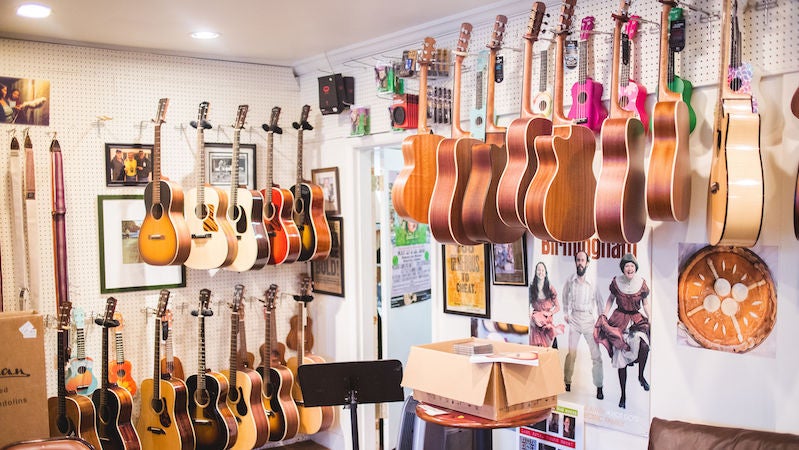
Allen says a big reason why Herb received this award goes beyond his gifted musicianship. “It’s his heart,” Allen says. “[From] all the people in the [bluegrass] community, I’ve only heard words of admiration and adoration about Herb.”
It was people like this who also nominated him for initiation into the Alabama Bluegrass Music Hall of Fame. “You can win an Emmy, sell a lot of records, or win a Grammy, sell a lot of records, and be a jerk,” Herb says. “But the people who voted on me for that award had known me for 50 years, so it meant more to me than just success.”
Herb’s willingness to serve people has earned him much of the respect he has today. “He really understands the power of investing in people,” Allen says.
That’s what Herb has done, in a very real sense. He’s built a community out of a business, all while doing what he loves to do. And there’s no sign of slowing down anytime soon. “They won’t let me quit,” he says of everyone who comes through Fretted Instruments. “If you retire, we’ll come to your house,” they say.
Herb jokes that somehow, he’s gotten away with it: while everyone else had jobs, he just had a good time. “That’s the idea of this store,” he says, “— if you’re not having fun, you’re doing something wrong.”
What’s in a Little Herb?
One of the guitars Herb carries at Fretted Instruments is Collings. A small maker based in Austin, Texas, they don’t mass produce their instruments, so Herb says everything they craft is “real good and … real expensive.”
Herb has actually designed a couple of Collings guitars that now bear his name. American singer-songwriter Kate Campbell was going to Europe and wanted a little guitar she could carry on her back, so Herb designed a Collings specially for her: the Little Herb. Later, he also designed a Big Herb, named for his dad.
When designing a guitar, you have a “menu” of options you can choose from. Herb chose Adirondack spruce top wood, dark binding, white tuners, a tiger-stripe pick guard and sunburst finish. The man himself says you can call out to Collings any time, tell them you want a Little Herb, and they’ll know exactly what it is.

